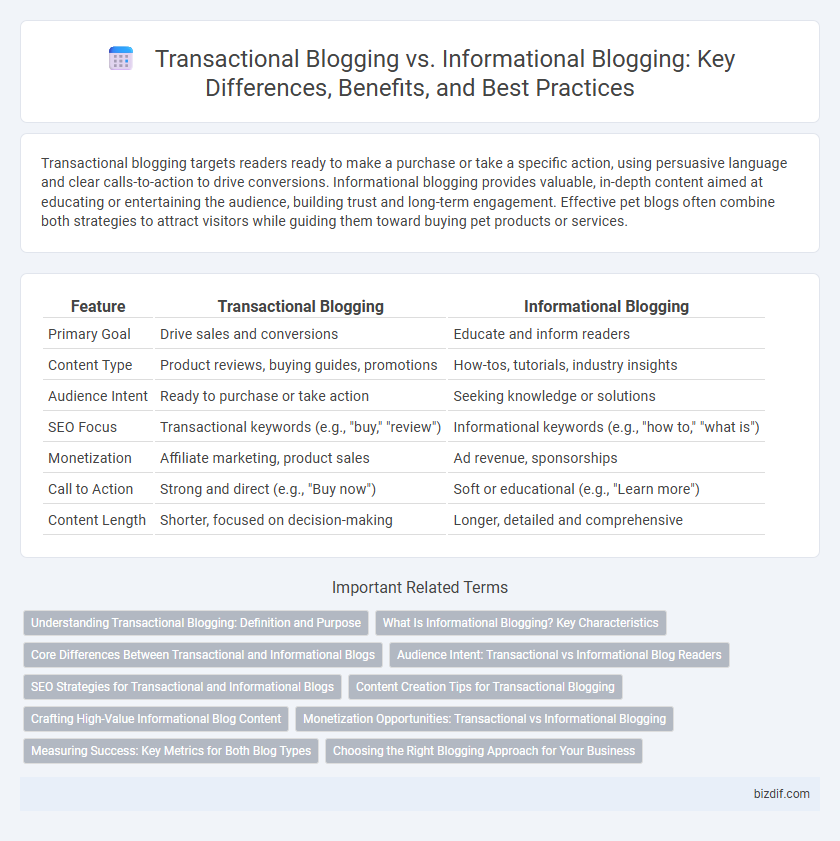Transactional blogging targets readers ready to make a purchase or take a specific action, using persuasive language and clear calls-to-action to drive conversions. Informational blogging provides valuable, in-depth content aimed at educating or entertaining the audience, building trust and long-term engagement. Effective pet blogs often combine both strategies to attract visitors while guiding them toward buying pet products or services.
Table of Comparison
| Feature | Transactional Blogging | Informational Blogging |
|---|---|---|
| Primary Goal | Drive sales and conversions | Educate and inform readers |
| Content Type | Product reviews, buying guides, promotions | How-tos, tutorials, industry insights |
| Audience Intent | Ready to purchase or take action | Seeking knowledge or solutions |
| SEO Focus | Transactional keywords (e.g., "buy," "review") | Informational keywords (e.g., "how to," "what is") |
| Monetization | Affiliate marketing, product sales | Ad revenue, sponsorships |
| Call to Action | Strong and direct (e.g., "Buy now") | Soft or educational (e.g., "Learn more") |
| Content Length | Shorter, focused on decision-making | Longer, detailed and comprehensive |
Understanding Transactional Blogging: Definition and Purpose
Transactional blogging centers on creating content designed to drive specific user actions, such as purchases, sign-ups, or downloads, directly supporting business objectives. This type of blogging leverages targeted keywords and compelling calls-to-action (CTAs) to guide readers through the conversion funnel effectively. Understanding its purpose is crucial for businesses aiming to increase sales and generate leads through strategic content marketing.
What Is Informational Blogging? Key Characteristics
Informational blogging focuses on providing valuable, research-based content aimed at educating readers about specific topics without direct sales intent. Key characteristics include in-depth articles, how-to guides, and explanations designed to solve common problems or answer questions, enhancing user knowledge and trust. This type of blogging prioritizes audience engagement and SEO by targeting keywords that address users' informational queries.
Core Differences Between Transactional and Informational Blogs
Transactional blogging targets readers ready to make a purchase or take a specific action, emphasizing calls-to-action and product or service details. Informational blogging focuses on educating the audience with in-depth content, tutorials, and solutions to problems without direct sales intent. The core difference lies in the goal: transactional blogs drive conversions, while informational blogs build trust and authority through valuable insights.
Audience Intent: Transactional vs Informational Blog Readers
Transactional blog readers seek content that supports immediate purchasing decisions, valuing detailed product comparisons, reviews, and calls to action to facilitate conversions. Informational blog readers prioritize educational content, in-depth guides, and problem-solving resources to increase knowledge without immediate intent to buy. Understanding these distinct audience intents allows bloggers to tailor content strategies that maximize engagement and meet specific user needs.
SEO Strategies for Transactional and Informational Blogs
Transactional blogging targets users with high purchase intent by incorporating keywords like "buy," "discount," or "review," which helps improve conversion rates and drives sales through SEO. Informational blogging focuses on answering questions and providing valuable content that ranks for long-tail, question-based keywords, enhancing site authority and attracting organic traffic. Optimizing meta tags, internal linking, and using structured data schema tailored to each blog type maximizes search engine visibility and user engagement.
Content Creation Tips for Transactional Blogging
Transactional blogging requires content that persuades readers to take immediate action, emphasizing clear calls-to-action and product benefits. Focus on writing compelling headlines, detailed product descriptions, and customer testimonials to build trust and drive conversions. Optimize content for targeted keywords related to purchasing intent to attract high-conversion traffic and maximize ROI.
Crafting High-Value Informational Blog Content
Crafting high-value informational blog content requires in-depth research and a clear understanding of the target audience's needs, focusing on delivering actionable insights and solving specific problems. Informational blogging enhances user engagement and builds trust by providing comprehensive guides, how-tos, and expert advice that cater to readers' intent for knowledge and learning. Unlike transactional blogging aimed at driving immediate sales, informational blogs establish authority and long-term traffic by prioritizing educational value and relevance.
Monetization Opportunities: Transactional vs Informational Blogging
Transactional blogging centers on content designed to drive immediate sales or conversions, offering higher monetization opportunities through affiliate marketing, sponsored posts, and product promotions. Informational blogging builds audience trust by providing valuable knowledge, which can lead to long-term revenue via ad networks, email marketing, and brand partnerships. Combining both approaches maximizes income by capturing readers at different stages of the buyer journey.
Measuring Success: Key Metrics for Both Blog Types
Measuring success in transactional blogging centers on conversion rates, revenue generated, and click-through rates, reflecting direct user actions and sales impact. Informational blogging success prioritizes metrics like page views, average time on page, and social shares, indicating audience engagement and content value. Both types benefit from monitoring bounce rates and organic search traffic to evaluate overall effectiveness and user retention.
Choosing the Right Blogging Approach for Your Business
Transactional blogging targets direct conversions by promoting products, services, or offers designed to drive sales or leads, making it ideal for businesses focused on immediate revenue generation. Informational blogging provides valuable, educational content that builds trust, authority, and long-term audience engagement, suitable for brands aiming to establish expertise and nurture customer relationships. Selecting the right blogging approach depends on your business goals, whether prioritizing quick transactions or fostering sustained audience connection and brand loyalty.
Transactional Blogging vs Informational Blogging Infographic

 bizdif.com
bizdif.com